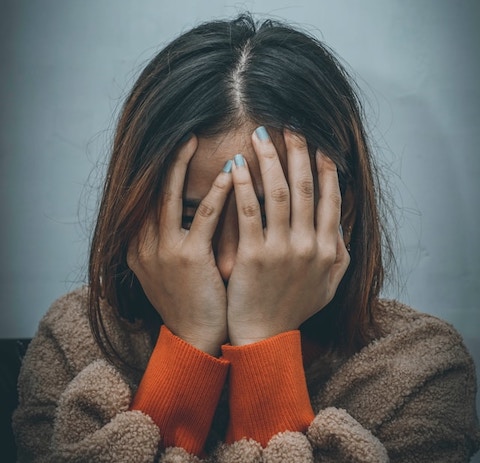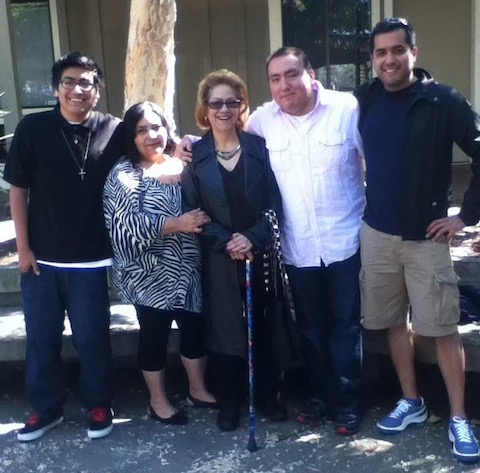
27 May ‘It Crashed Into My Life’: How a Latina Leader Lives—and Leads—with PTSD

“Mental illness doesn’t disqualify you from leadership,” writes Pittsburg City Council member Angelica Lopez. “I’ve also learned that being Mexican American and prioritizing mental health are not mutually exclusive.” (Courtesy of Angelica Lopez)
Editor’s Note: This is part of our coverage for Mental Health Awareness Month, reflecting the theme of this year’s campaign by the National Alliance on Mental Illness: “In every story, there’s strength.”
The author has been a Pittsburg City Council member since 2022 and has her own law firm.
Commentary, Angelica Lopez
I grew up in a culture that taught me to just pray through sadness and pain. In our Mexican American home, we didn’t talk about anxiety, depression, or trauma. We didn’t have language for mental illness; we had “nervios,” “berrinches” (tantrums) or “locura.” Seeking help was for the weak.
My name is Angelica, and I am a first-generation Mexican American woman who has battled — and continues to live with — PTSD, depression and anxiety. My journey has taken me from the depths of hospitalizations to the heights of earning a doctorate degree, being elected to public office, and advocating for mental health in spaces where mental illness is still stigmatized. This is a story of shame, survival and, ultimately, of self-acceptance.
PTSD didn’t knock politely. It crashed into my life with flashbacks, panic attacks, sleepless nights, and an overwhelming sense that I was unsafe even in my own skin. Instead of understanding, I was met with denial, mainly my own, and that of my family and community.
“Estás loca?” … “Just go to church.” “You need to stop being so dramatic.” Words that my loved ones constantly used to label my condition. I internalized the shame. I tried to function through it by going to school and work and smiling at family functions. Pretending I was OK became too heavy. I broke down. I was hospitalized more than once. There were moments I thought I would never get out of that dark hole.
It was in those awful hospital rooms where I found glimpses of light: my own personalized faith in Jesus Christ, therapists who validated my symptoms, and medication that began to create space between my pain and me. That was the beginning of my healing.
Therapy taught me tools, but education gave me power. I began to study myself by studying my brain, my triggers, my trauma. I also studied the systems that failed people like me, who are people of color, children of immigrants, survivors of trauma.
It was not an easy road. Trauma doesn’t take a break because you have responsibilities. Panic attacks don’t care about being out in public. Sadness sometimes lingers for weeks, even months, and disrupts our day to day. Somehow, I kept going through tears, setbacks, and low self-esteem. I earned my doctorate degree not despite my mental illness but because I refused to let it define my limits.
Years later, when I became an elected official, I knew I wasn’t just there to represent my city. Rather, I was there to represent every child of immigrants who was told to keep quiet, every survivor who was shamed into silence, and every person struggling behind closed doors.
Mental illness doesn’t disqualify you from leadership. If anything, it has made me more empathetic, more human, and more aware of the urgency to build systems that prioritize mental wellness as much as any other public policy.
I now speak publicly, vulnerably and unapologetically about my journey. I speak about therapy and all the times I thought I wouldn’t make it. I am proud of the community I’ve now built that treats mental wellness with the same seriousness as any physical ailment.
Today, I am surrounded by people who honor my boundaries, understand my trauma, and celebrate my healing. This community didn’t come easy, but it came through hard conversations, letting go of toxic relationships, and rewriting the narrative I grew up with.
I’ve learned that laughing and crying can coexist. That healing isn’t linear. That celebrating a win can be followed by a panic attack, and both are valid. I’ve also learned that being Mexican American and prioritizing mental health are not mutually exclusive. We can hold both: our culture and our healing.
If you’re reading this and carrying your own invisible weight, I hope you believe this: You are not broken. You are not “crazy.” You are not alone.
It takes courage to ask for help. It takes resilience to survive trauma. It takes radical self-love to build a life that honors your mind as much as your body.
I am living proof that you can carry trauma and still rise. That you can feel shame and still speak your truth. That you can be a daughter/son of immigrants, a survivor of PTSD, and still earn a doctorate degree, advocate for others, and lead.






No Comments